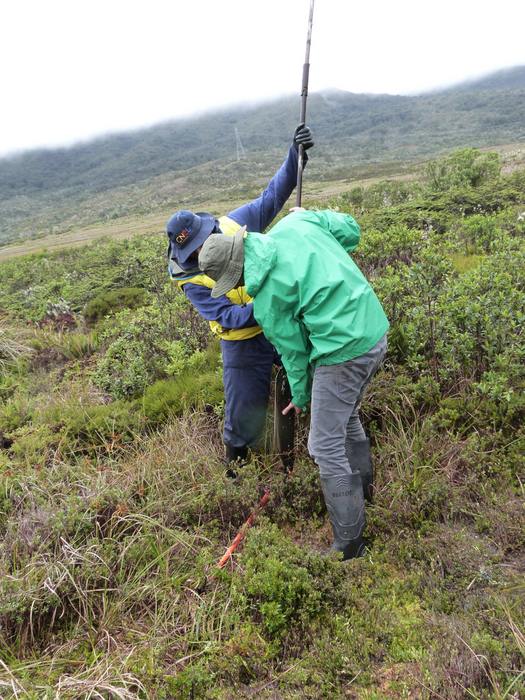Fungal spores found in dung have revealed that large animals went extinct in two “waves” in the Colombian Andes.

Credit: J. Oughton 2019
Fungal spores found in dung have revealed that large animals went extinct in two “waves” in the Colombian Andes.
Spores of coprophilous fungi pass through the guts of megafauna (animals over 45kg) as part of their life cycle, so the presence of the spores in sediment samples shows large animals lived in a certain place and time.
The study, by the University of Exeter, found that large animals became locally extinct at Pantano de Monquentiva about 23,000 years ago, and again about 11,000 years ago – with major impacts on ecosystems.
The study used samples from a peat bog in Pantano de Monquentiva, located about 60 km from Bogota in the eastern cordillera. The study was the first of its kind conducted in Colombia.
With biodiversity now in crisis, the findings highlight how the disappearance of large animals could once again transform ecosystems that sustain wildlife and humans.
“We know that large animals such as elephants play a vital role in regulating ecosystems, for example by eating and trampling vegetation,” said Dr Dunia H. Urrego, of Exeter’s Global Systems Institute.
“By analysing samples of fungal spores, as well as pollen and charcoal, we were able to track the extinction of large animals, and the consequences of this extinction for plant abundance and fire activity.
“We found the Monquentiva ecosystem changed dramatically when large animals disappeared, with different plant species thriving and wildfires increasing.”
Analysis of the fungal spores does not show which large animals were present, but species known to roam Colombia in this period include the giant armadillo and the six-metre-tall giant ground sloth.
The findings show that plentiful megafauna existed in the area for thousands of years, then disappeared entirely about 23,000 years ago.
About 5,000 years later, megafauna began to live in the area again – likely at lower numbers – before another wave of extinction about 11,000 years ago reduced them almost to zero.
The cause of these local extinctions is unknown, but climate changes and hunting by humans are two possibilities. Researchers have even suggested that a meteorite strike was the cause.
“After the megafauna vanished, plant species at Monquentiva transitioned, with more woody and palatable plants (those favoured by grazing animals), and the loss of plants that depend on seed dispersal by animals,” said first author Felix Pym, a Masters by Research in Physical Geography student at the University of Exeter.
“Wildfires became more common after the megafauna extinctions – presumably because flammable plants were no longer being eaten or trampled upon.
“Overall, our findings show that this habitat was highly sensitive to the decline of its megafaunal populations.”
The paper concludes that, given the current biodiversity crisis, conservation efforts must account for the effects of local herbivore declines on the dispersal of certain plant species, on fire activity, and the potential loss of ecosystem services (the value humans gain from nature).
The paper, published in the journal Quaternary Research, is entitled: “The timing and ecological consequences of Pleistocene megafaunal decline in the eastern Andes of Colombia.”
Journal
Quaternary Research
DOI
10.1017/qua.2022.66
Subject of Research
Animals
Article Title
The timing and ecological consequences of Pleistocene megafaunal decline in the eastern Andes of Colombia
Article Publication Date
26-Apr-2023




